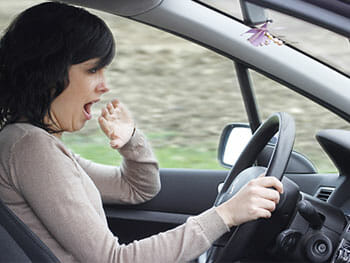
By now, most of us could recite chapter and verse with regard to drinking and driving—in short, don’t do it. However, have you ever considered how sleeping medications affect your driving skills? If you take prescription drugs to help you sleep, you could be as impaired the morning after taking a sleeping pill as if you’d had a couple of stiff drinks before leaving for work. Every day, as many as a quarter-million people fall asleep while driving. Drowsy driving results in more than 100,000 crashes and 1,550 deaths annually in the U.S., according to the National Highway Traffic Safety Administration.
Doubling Your Risk
Recent research shows that those who are new to prescription sleep aids have double the risk of an accident, according to a study done by the University of Washington School of Pharmacy and the Group Health Research Institute. The increased risk for new users could continue for as much as one year of regular usage of the medications temazepam (Restoril), zolpidem (Ambien, Ambien CR) and trazodone (Desyrel). Of the three drugs, temazepam users had the smallest chance of a motor vehicle accident, while zolpidem (Ambien) users were more than twice as likely to have an accident.
If you are a new user of any of these medications, start worrying now. Your risk of having an accident is the same as for someone with a blood alcohol concentration (BAC) level of from 0.06 to 0.11 percent. Just for perspective, the legal threshold for driving under the influence in all 50 states is 0.08 percent BAC.
Non-Drug Treatments for Insomniacs
A better way to go, if you are having insomnia problems, is to try fixing your “sleep hygiene.” Sleep hygiene is nothing more than a set of “do’s and don’ts” that help you fall asleep, stay asleep, and sleep more deeply without resorting to medications.
If, after working on your sleep hygiene, you still are not having restful nights, you might want to consider cognitive-behavioral therapy (CBT). CBT for insomnia helps you identify non-productive thoughts and behaviors that can interfere with getting a decent night’s sleep. Instead of drugging you, CBT can assist you in identifying the root causes of your sleep problems and in correcting the behaviors that make them worse. In that way, you can learn to sleep properly again, without resorting to the drugs that can increase your risk of a car accident many hours after you take them.
We’re Listening. How Can We Help?
The aftermath of a vehicle collision can be life-changing for the accident victims and their family, and often takes years of patience and dedication to overcome. If you believe another party was responsible for the injuries or losses you have suffered in a car crash in Maryland, Steve Heisler has the experience necessary to successfully help accident victims get their lives back on track. Contact the Law Offices of Steven H. Heisler today. We can help you obtain compensation for injuries you or your family member sustained. Call (410) 625-4878 for a free consultation, or use our online form.
